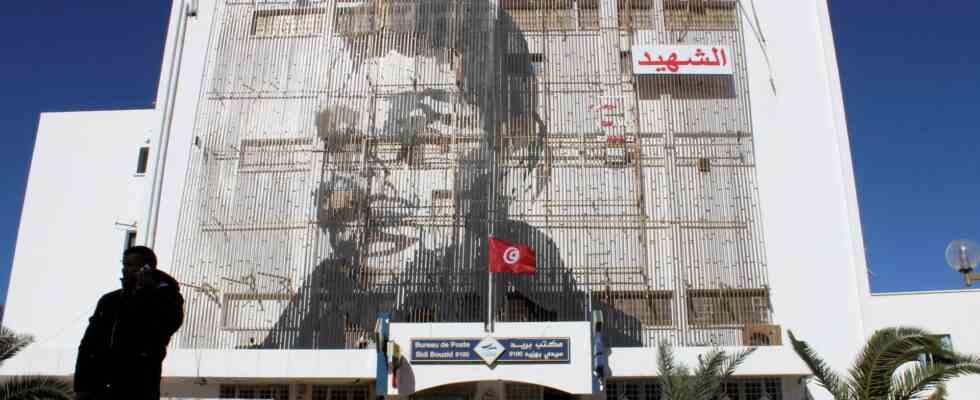Status: 12/17/2022 12:06 p.m
Twelve years ago, a young Tunisian set himself on fire – triggering a revolution in the country. The expectations of the time after that have hardly been fulfilled. A visit to the place where it all began.
Majeddine Badri points to the memorial – a rather simple stone monument – the wooden handcart of greengrocer Mohamed Bouazizi. The 21-year-old also drives such a handcart with large wheels loaded with vegetables. He wears a cropped black beard, a dark baseball cap, jeans and sneakers.
“This is the memorial for Mohamed Bouazizi, this is his cart. They didn’t do much else,” says Majeddine. In addition to this large picture of his face on a building, he says, it cost 40,000 dinars – a good 12,000 euros.
Greengrocer Bouazizi set himself on fire
Majdeddine is from Sidi Bouzid, a town about four hours’ drive from the capital, Tunis. Twelve years ago, the greengrocer Bouazizi made the headlines here: on December 17, 2010, the then 26-year-old set himself on fire – out of desperation over his economic situation and the arbitrary nature of the police.
“I was in fourth grade, my school was not far from where Bouazizi burned himself,” says Majdeddine. He came from school around 4 p.m. and remembers a crowd, the ambulance, the police. “I was little and didn’t really understand what was going on, but it wasn’t normal for someone to get burned.”
“We didn’t benefit from the revolution”
Bouazizi’s self-immolation, from which he died a few weeks later, triggered mass protests in the country – and with it the revolution. We ask what is left of the revolution in Sidi Bouzid. Not much, says Majdeddine.
“It triggered a catastrophe here. The people in Sidi Bouzid really suffered,” said the young greengrocer. There is still no good hospital, no work, unemployment has increased, the illiteracy rate. “More and more children are dropping out of school. There are many big problems here. We didn’t benefit from the revolution.”
The only thing is that you can talk since then. “But a person who talks but has no money, can’t work, can’t develop further, how are you supposed to live there?” asks Majdeddine. The revolution left deep scars, “but we didn’t gain anything”.
Desires after the pre-revolutionary period
The expectations of the time after the revolution have not been fulfilled. Many in Sidi Bouzid even say they wish they could go back to the days before the revolution and their ex-dictator Ben Ali. The reason for this is the economic situation.
The morning I meet Majdeddine, he says he has earned 15 dinars – that’s almost five euros. He didn’t work at all for the month. His friends feel the same way. “Twelve years ago everything was still cheap, not like it is today. People still had money and the Tunisian dinar was strong,” he says. But now the currency is falling and life is getting more and more expensive.
Majdeddine’s trips to Europe fell through
That’s why Majdeddine has twice tried to get to Europe via the Mediterranean. Secretly. He failed twice, once because the engines gave up the ghost, another time because the tugboat with the boat didn’t even show up. He doesn’t want to try again, says Majdeddine – for the sake of his mother and younger siblings.
It’s all a question of money. If Majdeddine had that, he would happily go abroad. But preferably in a regular, organized way. Not another risk like that. “My mother cried at the time and cleaned the house because she thought people would come by to say condolences,” he says. “She thought I was dead because my phone was off for two and a half days. I don’t want her to experience that again.”
No hope anymore
Despite this, Majdeddine has long lost hope for change in his country. He doesn’t think much of the parliamentary elections. “What should I expect from the elections, so many as there have been since then? All the presidential elections – the troika.” He doesn’t even remember the names because they wouldn’t have done anything for him, changed anything.
Majdeddine is not alone in his frustration. Many young people want to leave Tunisia. But the 21-year-old doesn’t want to give up. He saves money, has started to learn German – with videos from the Internet, he says, while showing a small notebook with meticulously written German vocabulary. Majdeddine wants to take his future into his own hands. He expects no support from his state.
12 years of Mohamed Bouazizi’s self-immolation
Dunja Sadaqi, ARD Rabat, 17.12.2022 11:54 a.m

